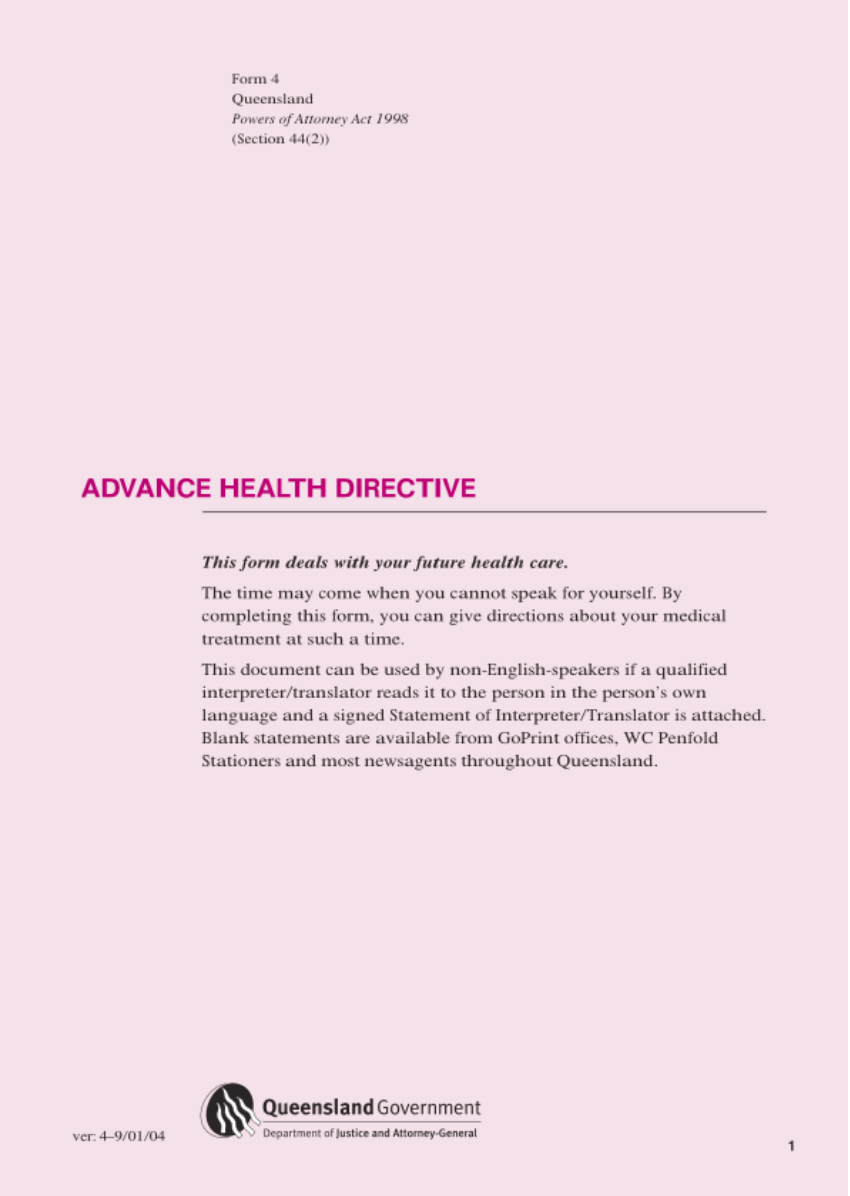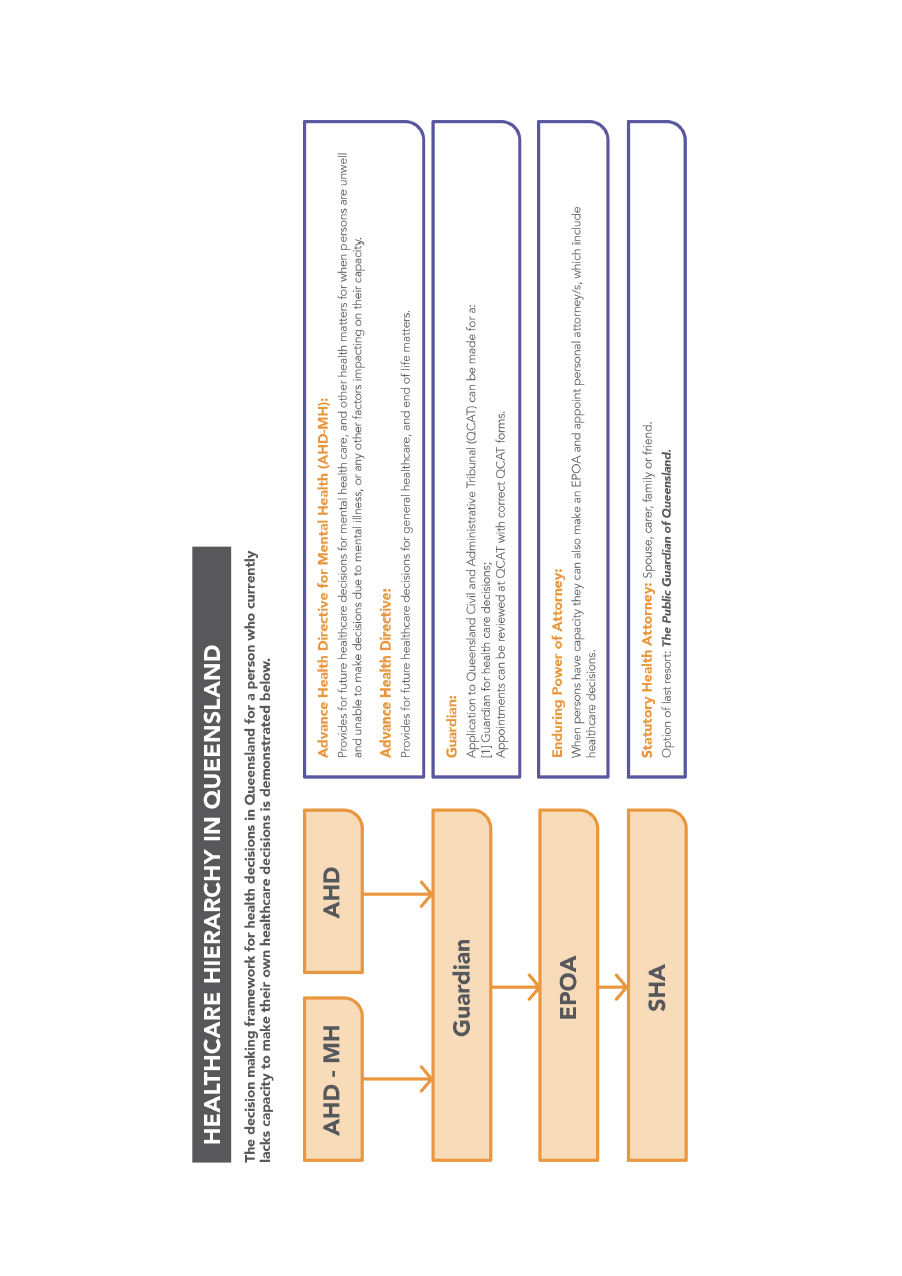Advance Health Directive (AHD)
An Advance Health Directive (AHD) (sometimes called a living will) is a formal way to give instructions about your future health care. It comes into effect only if your cognitive health deteriorates and you become unable to make your own decisions (i.e. lose capacity to make decisions).For more information including:
- What an AHD includes
- Who can make one
- When to make one
- How to make one
- Specific instructions you can include
- What to do with your AHD
AHD Form Link
AHD Form – Download from Qld Gov WebsiteNOTE: The current form is under review by Queensland Government, with new versions due in 2020. Any current documents which have been validly completed will remain valid legal documents.
Clinical Guidelines, Forms and Requirements – Qld Health Documents
Treatment and Care Documents – Clinical Practice Guidelines for AHD (Queensland Health)Advance Care Planning – Clinical Practice Guidelines (Queensland Health)
More AHD information
Advance Care Planning – Advance Care Plan QldPublic Guardian Qld – Advance Health Directive
Reference: https://www.qld.gov.au/health/mental-health/rights/decision
Advance Health Directive for Mental Health (AHD-MH)
An Advance Health Directive for Mental Health (AHD-MH) is a document that allows people to make decisions for themselves about their own healthcare.This document can be used at a future time if they become unwell and are unable to make certain decisions. Under an AHD, people can:
- agree to the treatment and care they would like to receive
- state the treatment and care they do not want to receive
- appoint another person to make decisions about their treatment and care
- express their views, wishes and preferences about healthcare and personal matters.
AHD-MH Form link and Video
AHD-MH Guide and Form – Download from Queensland Health WebsiteVideo – How to Complete the AHD-MH Form

More Information About AHD-MH
Video – What is the AHD-MH? (Qld Health)Video – Advance Health Directives for Mental Health
AHD Brochure (Queensland Health)
Clinician Training Slides – AHD MH
Consumer Resources ADH-MH and Webinar
Office of Public Guardian
ELDAC – End of Life Directions for Aged Care
Advance Care Planning – An Advance Care Directive (Directive) is an instruction that a person with capacity makes about future health care decisions. It can be used to:- make specific decisions about future treatment. This can include consenting in advance to treatment but more commonly involves refusing treatment, even if that might result in death.
- express general wishes (for example goals of care, or wanting to die at home rather than in hospital) and personal values (spiritual, religious or cultural beliefs relevant to the person’s care).
- in most states and territories, appoint a substitute decision-maker to make future health care decisions if the person loses capacity.
Reference and Factsheets: Factsheet – Advance Care Planning
Power of Attorney Act 1998
s42 Principal’s capacity to make an advance health directive
1. A principal may make an advance health directive, to the extent it does not give power to an attorney, only if the principal understands the following matters—
(a) the nature and the likely effects of each direction in the advance health directive;
(b) a direction operates only while the principal has impaired capacity for the matter covered by the direction;
(c) the principal may revoke a direction at any time the principal has capacity for the matter covered by the direction;
(d) at any time the principal is not capable of revoking a direction, the principal is unable to effectively oversee the implementation of the direction.
Note— If there is a reasonable likelihood of doubt, it is advisable for the witness to make a written record of the evidence as a result of which the witness considered that the principal understood these matters.(b) a direction operates only while the principal has impaired capacity for the matter covered by the direction;
(c) the principal may revoke a direction at any time the principal has capacity for the matter covered by the direction;
(d) at any time the principal is not capable of revoking a direction, the principal is unable to effectively oversee the implementation of the direction.
2. A principal may make an advance health directive, to the extent it gives power to an attorney, only if the principal also understands the matters necessary to make an enduring power of attorney giving the same power.
Note— See section 41 (Principal’s capacity to make an enduring power of attorney).
Reference: Power of Attorney Act 1998 (Qld)










